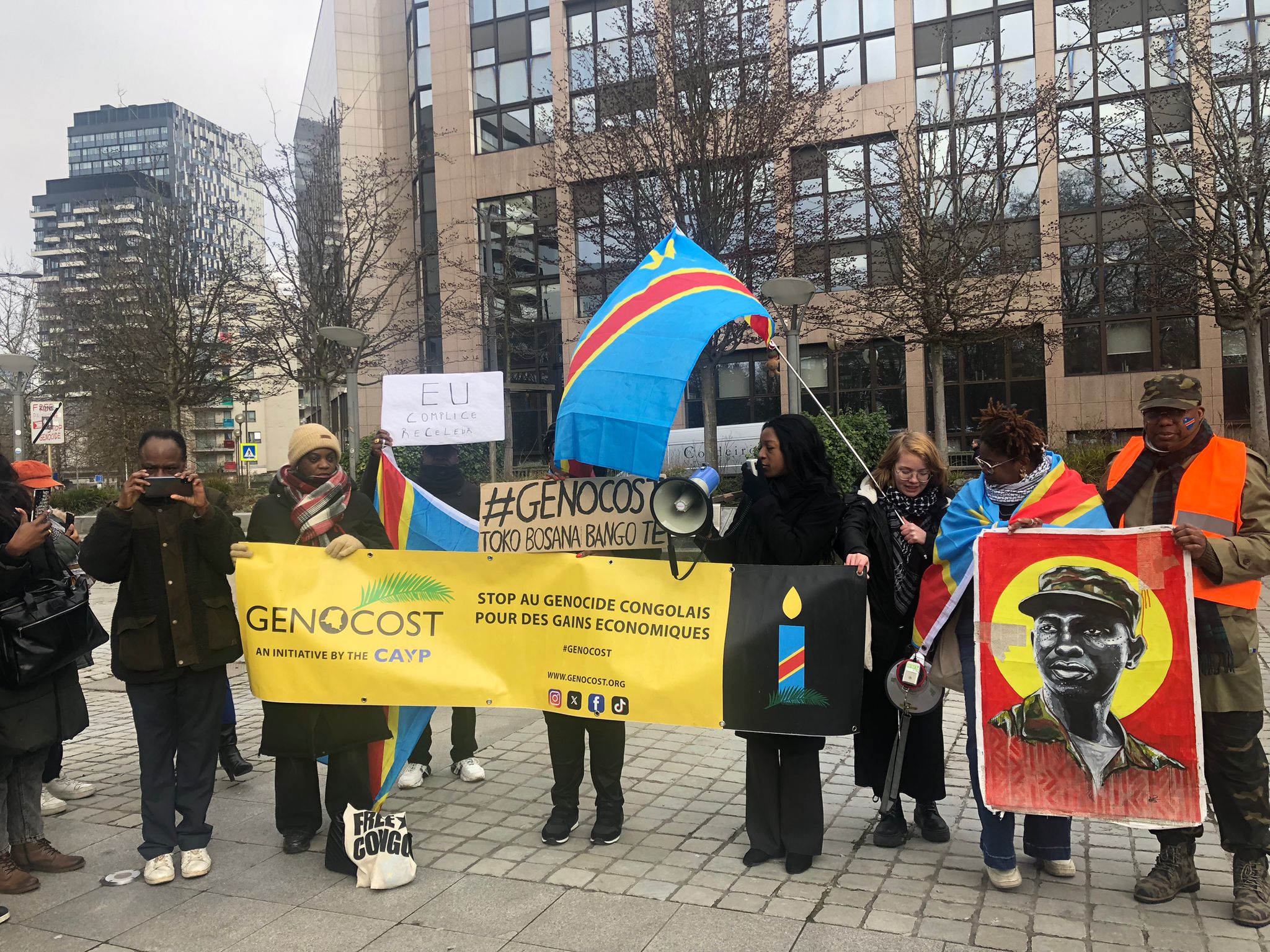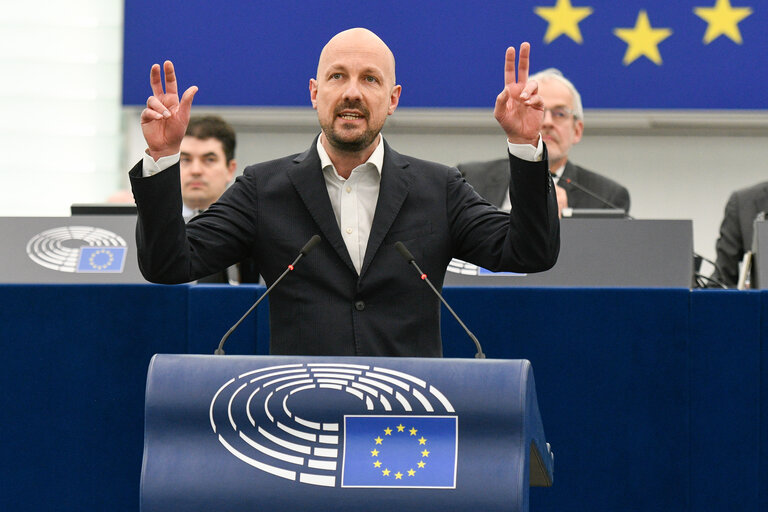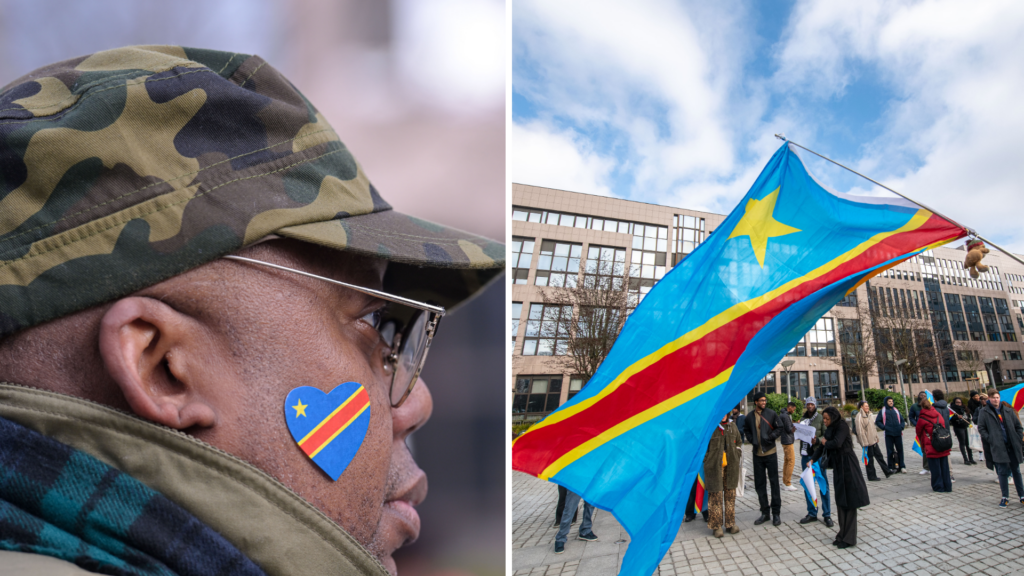The Democratic Republic of the Congo (DRC) is suffering a fresh wave of violence after Rwanda-backed rebels captured the city of Goma last week. Protestors in Brussels have highlighted Europe's complicity in a seemingly endless saga of violence.
Around 100 protestors gathered at Place Jean Rey outside the European Parliament on Monday afternoon. Some were waving DRC flags, while others were sporting Palestinian keffiyehs and all chanting "Rwanda kills, Congo bleeds! Stop the war that has been going on for almost 30 years!"
The Rwandan-backed M23 militia's takeover of the eastern Congolese city Goma garnered widespread media coverage last week. The group declared a "humanitarian" ceasefire on Monday, but has killed at least 900 people and there are fears of extreme hunger among the general population.

Credit: The Brussels Times
The catastrophe is in the spotlight now, but Belgo-Congolese activist Brenda Odimba of the non-proft Mwasi has been campaigning for an end to bloodshed in the DRC for much of her life.
"We have been talking about genocide and rape as a weapon of war for 30 years," she told the protest, welling up as she spoke. "As a European, it hurts to see the deafening silence from the media and politicians, while the EU in particular is responsible for what is happening. We will not give up until the genocide is over."
'More than a quarrel between two countries'
"This is more than a quarrel between two countries or two ethnic groups," Odimba told The Brussels Times. "This discourse is being used to minimise the problem."
A dense network of militias backed by other countries and corporate actors exploit the DRC for its rich natural minerals such as gold and cobalt – resources with an estimated combined value of $24 trillion.
One such militia is the M23 group, which says it protects Hutu minorities in eastern Congo but in reality extracts minerals from the region. It then "dumps" them in "dummy mines" in Rwanda to be "remined". This illegal activity is overseen by Rwanda, which is in "de facto control" of the militia according to UN experts.
Nevertheless, the EU signed a Memorandum of Understanding (MoU) with the country in February 2024 that gives it access to these natural minerals. Protestors and several countries are therefore calling on the bloc to suspend the agreement.
Minerals needed for 'green' transition
M23's actions in the DRC are creating a "catastrophic military situation, but above all an even more catastrophic humanitarian situation," said former Belgian Foreign Affairs Minister Bernard Quintin (MR) last week. "The sovereignty and territorial integrity of the DRC must be respected by all, at all times and in all places."
European Commission spokespeople have indicated that there is no intention of scrapping the MoU as it is an essential element to achieving a so-called green and digital transition.

Belgian MEP Marc Botenga speaks about tensions between Rwanda and the DRC in 2023. Credit: European Parliament
The agreement, in addition to €40 million granted to Rwanda via the European Peace Fund (EPF) and more than €900 million through Global Gateway, is the EU's answer to China's Belt and Road Initiative. This means that the EU is an "active actor in the plundering of the DRC," according to Belgian MEP Marc Botenga (PTB/The Left).
"When you make a deal with a country accused over and over again of violating Congolese sovereignty, destabilising the region and plundering raw materials, you are complicit in what happens afterwards," he told The Brussels Times. "The complicity needs to end."
Does the EU stand for human rights?
Solidarity movements across the world are uniting in their opposition to colonialism, neocolonialism and capitalism. Multiple speakers at the protest on Monday alluded to Belgium's pro-Palestine movement and the parallels between two peoples' suffering.
"Europe doesn't realise how quickly its image is collapsing throughout the world," says Botenga. "People want an EU that stands for human rights, international law and fair trade. We need a fundamentally different foreign and trade policy."
Sarah (23) is a university student who travelled from Cologne in Germany to attend the protest in Brussels.
"The Congolese people are not asking for reparations or money. All they are asking is for support to be withdrawn from the aggressor, which is Rwanda," she told The Brussels Times. "We know that this agreement will inevitably involve theft and the violence that goes with it."
"Every member of the UN Security Council has condemned Rwanda for its activities in Congo, but now we want to see the next steps: action must follow."

